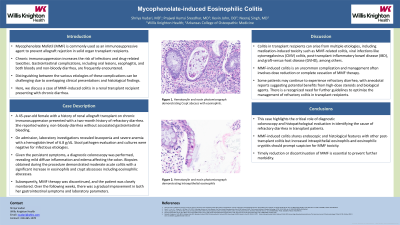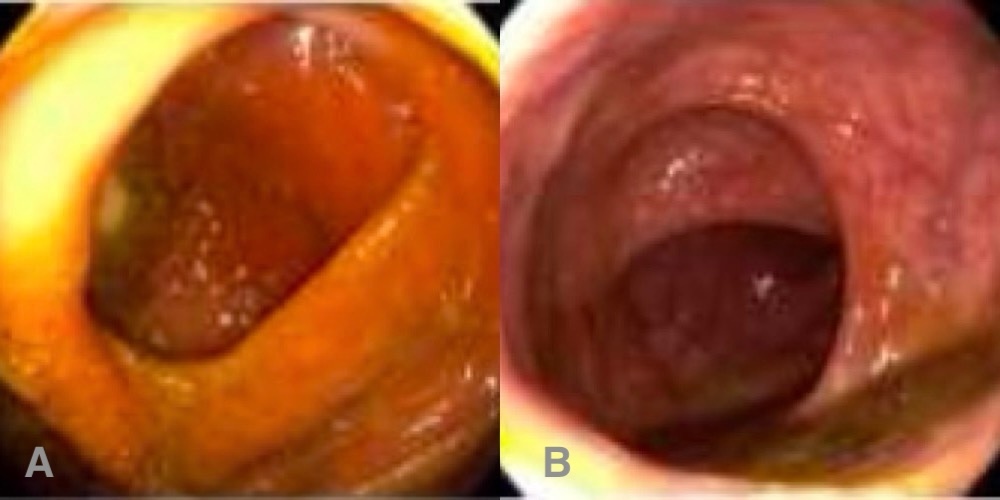Monday Poster Session
Category: Colon
P2079 - Mycophenolate-Induced Eosinophilic Colitis
Monday, October 28, 2024
10:30 AM - 4:00 PM ET
Location: Exhibit Hall E

Has Audio

Shriya Vudari, MD
Willis Knighton Health System
Shreveport, LA
Presenting Author(s)
Shriya Vudari, MD1, Prajwal Kumsi Sreedhar, MD1, Kevin John, DO2, Neeraj Singh, MD1
1Willis Knighton Health System, Shreveport, LA; 2Arkansas College of Osteopathic Medicine, Shreveport, LA
Introduction: Solid organ transplant recipients are at increased risk of opportunistic infections and drug-related toxicities. Gastrointestinal (GI) complications, such as oral lesions, esophagitis, gastritis, and colitis, are common among transplant recipients. However, distinguishing between infectious and non-infectious causes of these complications can be challenging due to overlapping clinical presentations and histological findings. Mycophenolate Mofetil (MMF), an immunosuppressive agent frequently used post-transplant, is known to cause GI side effects such as nausea, vomiting, and diarrhea. However, the development of eosinophilic colitis due to MMF is rarely reported.
Case Description/Methods: A 45-year-old female with a history of kidney transplant 8 years prior presented with a two-month history of persistent watery, non-bloody diarrhea without abdominal pain. Laboratory tests showed leucopenia (white blood count of 1700/microliter) with undetectable eosinophils and anemia (hemoglobin level of 6.4 g/dL). Stool pathogen evaluation and cultures were negative for infectious causes. Serum cytomegalovirus (CMV) and Epstein Barr virus (EBV) polymerase chain reaction (PCR) assays were also negative. Given the ongoing symptoms, a diagnostic colonoscopy was performed, revealing mild diffuse inflammation and edema in the ascending and descending colon. Biopsies taken during the procedure confirmed moderate eosinophilic colitis with crypt eosinophilic abscesses. Subsequent discontinuation of MMF led to complete resolution of the patient’s symptoms over the following 2 weeks.
Discussion: MMF-induced eosinophilic colitis is a rare complication following solid organ transplant. It is crucial to differentiate MMF-induced colitis from other causes of post-transplant diarrhea, such as Clostridium difficile infection, CMV colitis, post-transplant inflammatory bowel disease (IBD), and graft-versus-host disease, among others. Additionally, primary eosinophilic colitis, helminthic infections, autoimmune diseases, and hypereosinophilic syndrome should also be considered in the differential diagnosis. Management of MMF-induced eosinophilic colitis typically involves dose reduction or discontinuation of MMF therapy. Some patients may experience persistent diarrhea, and anecdotal reports suggest potential benefits from high-dose steroids and biological agents in such cases. Accurate diagnosis and optimal management of MMF-induced eosinophilic colitis are essential in the post-transplant setting to improve patient outcomes.

Disclosures:
Shriya Vudari, MD1, Prajwal Kumsi Sreedhar, MD1, Kevin John, DO2, Neeraj Singh, MD1. P2079 - Mycophenolate-Induced Eosinophilic Colitis, ACG 2024 Annual Scientific Meeting Abstracts. Philadelphia, PA: American College of Gastroenterology.
1Willis Knighton Health System, Shreveport, LA; 2Arkansas College of Osteopathic Medicine, Shreveport, LA
Introduction: Solid organ transplant recipients are at increased risk of opportunistic infections and drug-related toxicities. Gastrointestinal (GI) complications, such as oral lesions, esophagitis, gastritis, and colitis, are common among transplant recipients. However, distinguishing between infectious and non-infectious causes of these complications can be challenging due to overlapping clinical presentations and histological findings. Mycophenolate Mofetil (MMF), an immunosuppressive agent frequently used post-transplant, is known to cause GI side effects such as nausea, vomiting, and diarrhea. However, the development of eosinophilic colitis due to MMF is rarely reported.
Case Description/Methods: A 45-year-old female with a history of kidney transplant 8 years prior presented with a two-month history of persistent watery, non-bloody diarrhea without abdominal pain. Laboratory tests showed leucopenia (white blood count of 1700/microliter) with undetectable eosinophils and anemia (hemoglobin level of 6.4 g/dL). Stool pathogen evaluation and cultures were negative for infectious causes. Serum cytomegalovirus (CMV) and Epstein Barr virus (EBV) polymerase chain reaction (PCR) assays were also negative. Given the ongoing symptoms, a diagnostic colonoscopy was performed, revealing mild diffuse inflammation and edema in the ascending and descending colon. Biopsies taken during the procedure confirmed moderate eosinophilic colitis with crypt eosinophilic abscesses. Subsequent discontinuation of MMF led to complete resolution of the patient’s symptoms over the following 2 weeks.
Discussion: MMF-induced eosinophilic colitis is a rare complication following solid organ transplant. It is crucial to differentiate MMF-induced colitis from other causes of post-transplant diarrhea, such as Clostridium difficile infection, CMV colitis, post-transplant inflammatory bowel disease (IBD), and graft-versus-host disease, among others. Additionally, primary eosinophilic colitis, helminthic infections, autoimmune diseases, and hypereosinophilic syndrome should also be considered in the differential diagnosis. Management of MMF-induced eosinophilic colitis typically involves dose reduction or discontinuation of MMF therapy. Some patients may experience persistent diarrhea, and anecdotal reports suggest potential benefits from high-dose steroids and biological agents in such cases. Accurate diagnosis and optimal management of MMF-induced eosinophilic colitis are essential in the post-transplant setting to improve patient outcomes.

Figure: (A) Ascending colon and (B) Descending colon demonstrating diffuse inflammation and edema.
Disclosures:
Shriya Vudari indicated no relevant financial relationships.
Prajwal Kumsi Sreedhar indicated no relevant financial relationships.
Kevin John indicated no relevant financial relationships.
Neeraj Singh indicated no relevant financial relationships.
Shriya Vudari, MD1, Prajwal Kumsi Sreedhar, MD1, Kevin John, DO2, Neeraj Singh, MD1. P2079 - Mycophenolate-Induced Eosinophilic Colitis, ACG 2024 Annual Scientific Meeting Abstracts. Philadelphia, PA: American College of Gastroenterology.
